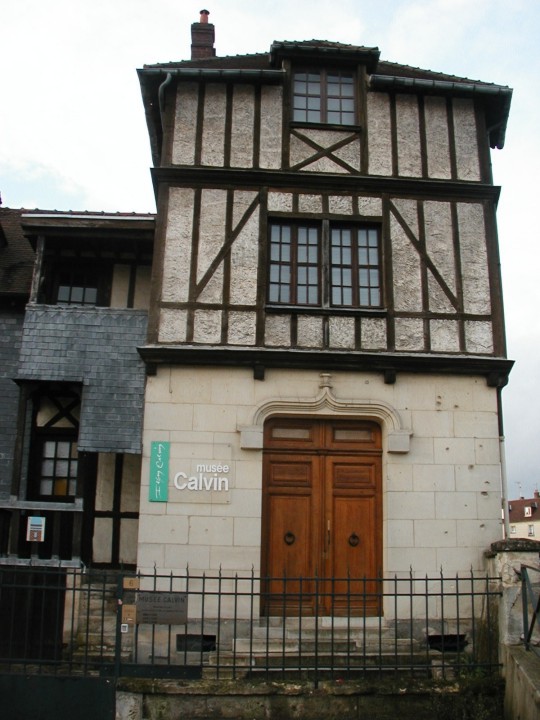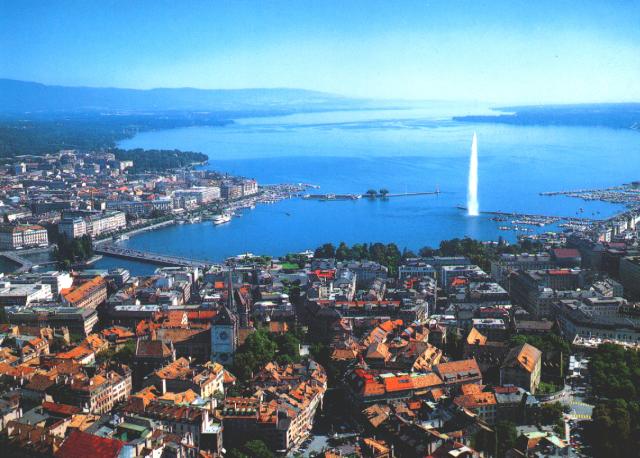John Calvin (1509–1564)
WYH2010H, Fall 2005
Links
Many of Calvin's works, including Bible commentaries and the Institutes, are available in English translation from CCEL. (But the Library of Christian Classics translation of the Institutes is better.) There are French and Latin works of Calvin here, too.
In particular, here's the preface to his commentary on the Psalms where he talks a bit about himself. This personal self-disclosure is rare for Calvin, and this short piece is often quoted.
Here's a brief introduction to Calvin from Washington State University. Oddly, it interprets Calvin as a Zwinglian. And here's another introduction to Calvin by Victor Shepherd of Tyndale Seminary. And another by William Bouwsma in the Encyclopedia Britannica; Bouwsma is a principal biographer of Calvin,
From Michigan State University, a page of links to Calvin materials. Here's another source page from someone named Barry McWilliams, a Presbyterian grocery clerk near Seattle.
A classic 1909 introduction to Calvin's theology by the famous (or notorious) B.B. Warfield of Princeton Theological Seminary is still worth reading.
If you just want the section of Calvin's Institutes dealing with predestination, here it is.
Calvin's life
 Jean Cauvin
was born in Noyon, Picardy, France, in 1509. (His birthplace is pictured
below.) Calvin comes from "Calvinus", the Latin form
of his name. He studied the humanities at the University of Paris, at
law at Orléans. He was thoroughly at home in the new humanism,
and his first published work was a commentary on a philosophical treatise
by the Roman writer Seneca.
Jean Cauvin
was born in Noyon, Picardy, France, in 1509. (His birthplace is pictured
below.) Calvin comes from "Calvinus", the Latin form
of his name. He studied the humanities at the University of Paris, at
law at Orléans. He was thoroughly at home in the new humanism,
and his first published work was a commentary on a philosophical treatise
by the Roman writer Seneca.
Identified with advanced French reformers and anxious that he might be
arrested, he headed for safety in Basel in 1536, but was diverted to Geneva.
There Guillaume Farel, the minister of the newly (and ambiguously) Protestant
city, persuaded him to stay, to join in his work. By 1538 they were unpopular
with many, particularly because they insisted on having the authority
to admit or repel persons from Holy Communion. Calvin was  forced
to leave, and settled in Strasbourg. There he married Idelette de Bure,
and their marriage was apparently a very close and very affectionate one.
In 1541 a new set of leaders in Geneva persuaded Calvin to return —
he was by no means enthusiastic about this. Through his leadership and
his ecclesiastical ordinances, and after a purge of his opponents in 1545,
he succeeded in turning Geneva into what the Scottish reformer John Knox
called "the most perfect school of Christ since the apostles."
Critics, however, thought his régime repressive and prudish. Calvin's
writings, and particularly his Institutes of the Christian Religion,
were extremely influential, and the Institutes in particular is
often seen as the most important single Protestant theological work of
the Reformation. Calvin died in Geneva in 1564.
forced
to leave, and settled in Strasbourg. There he married Idelette de Bure,
and their marriage was apparently a very close and very affectionate one.
In 1541 a new set of leaders in Geneva persuaded Calvin to return —
he was by no means enthusiastic about this. Through his leadership and
his ecclesiastical ordinances, and after a purge of his opponents in 1545,
he succeeded in turning Geneva into what the Scottish reformer John Knox
called "the most perfect school of Christ since the apostles."
Critics, however, thought his régime repressive and prudish. Calvin's
writings, and particularly his Institutes of the Christian Religion,
were extremely influential, and the Institutes in particular is
often seen as the most important single Protestant theological work of
the Reformation. Calvin died in Geneva in 1564.
Calvin's theological heritage
Although Calvin wrote copiously and clearly, there is much dispute about his theology. This is partly because there has emerged a wide variety of "Calvinisms," each claiming him as its progenitor. The churches which regard Calvin as their normative theologian are called the Reformed Churches. (Today the World Alliance of Reformed Churches counts 75 million members and adherents in 107 countries. English-speaking Reformed churches are usually called Presbyterian.)
The characteristic points of Calvin's theology which are usually named in overviews are (a) the authority of Scripture, conservatively interpreted, and (b) predestination, meaning that, at or before the beginning of the ages, God elected some to eternal life, and others to damnation. However, Calvin's approach to Scripture is strongly influenced in contemporary Christian humanism, and he often cites early theologians, especially Augustine, in support of his points. And predestination has a remarkably modest profile in his writings. Most scholarly students of Calvin now say that his theology is not dependent on any single doctrine or point.
Geneva today
